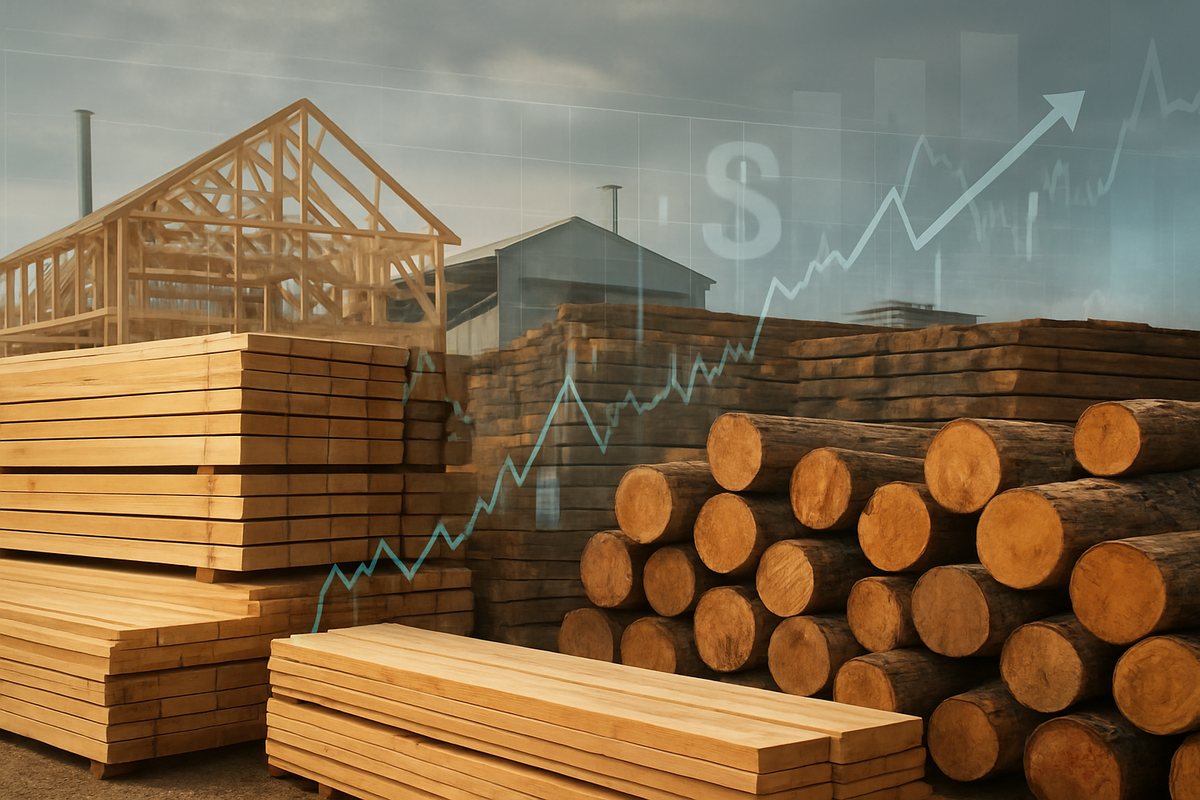
The third quarter of 2025 proved to be a challenging period for key players in the building materials sector, with Jeld-Wen (NYSE: JELD) and Boise Cascade (NYSE: BCC) reporting mixed to disappointing results. Both companies grappled with what their managements described as "subdued demand and commodity pricing headwinds," highlighting the significant influence of volatile lumber and wood product prices, coupled with broader market shifts, on their financial health. The intricate dance between rising input costs, driven in part by escalating tariffs, and a competitive market unwilling to absorb these increases, has painted a complex picture for the industry.
This period saw Jeld-Wen plunge into a significant net loss, while Boise Cascade experienced a substantial decline in profitability despite maintaining flat sales. The divergence in their financial outcomes, even amidst shared market pressures, underscores the varied impacts of the current economic climate and commodity price dynamics on different segments of the building materials supply chain. As the industry navigates these turbulent waters, stakeholders are closely watching how these giants adapt to persistent challenges in demand and the unpredictable nature of raw material costs.
Navigating the Headwinds: Q3 2025 Performance Unpacked
Jeld-Wen's Q3 2025 performance was particularly grim, with the company reporting a staggering net loss of $367.6 million, or -$4.30 per share. Adjusted for specific items, the loss was -$0.20 per share, significantly missing analyst expectations for a profit. Revenue also saw a notable decline of 13.4% year-on-year, landing at $809.5 million. Management attributed these poor results to "persistent market headwinds and price-cost pressures," compounded by a 10% decline in Core Revenues and market share losses, particularly in its door segment, due to aggressive competitor pricing. In response, Jeld-Wen announced strategic actions, including workforce reductions and a 30% reduction in product SKUs, signaling a proactive approach to cost management and operational efficiency.
Boise Cascade, while faring better than Jeld-Wen in terms of overall profitability, still reported a significant downturn. The company posted net income of $21.8 million, or $0.58 per share, on sales of $1.7 billion for the quarter. This represents a steep decline from the $91.0 million net income, or $2.33 per share, recorded in Q3 2024, despite sales remaining flat year-over-year. The most pronounced impact was felt in its Wood Products segment, which reported a loss of $12.1 million, a stark contrast to the $53.9 million income in the prior year. This was primarily driven by lower sales prices and volumes for Engineered Wood Products (EWP) and plywood, alongside higher per-unit conversion costs. The Building Materials Distribution (BMD) segment also saw income decrease due to reduced gross margins on commodity and EWP products.
The overarching factor influencing both companies was the dynamic and often challenging environment of lumber and wood product commodity prices. Q3 2025 was marked by significant upward pressure on prices, largely fueled by policy changes. In August 2025, U.S. tariffs on Canadian softwood lumber nearly doubled to 35.2%, directly increasing import costs and pushing domestic prices higher. Further increases to 30% on Canadian softwood lumber imports are anticipated. Despite a monthly decrease in futures, the Framing Lumber Composite was up 16.77% year-over-year in August 2025. Supply constraints, including mill closures and wildfires in British Columbia, further tightened the market. Demand signals were mixed; while U.S. housing starts showed some growth earlier in 2025, single-family housing starts decreased in July and August 2025 compared to the previous year, and the repair and remodeling (R&R) market remained subdued. This combination of rising input costs and fluctuating demand created a difficult operating landscape.
Corporate Crossroads: Winners, Losers, and Strategic Shifts
The recent market dynamics, particularly the volatility in lumber and wood product prices, have created distinct challenges for Jeld-Wen (NYSE: JELD) and Boise Cascade (NYSE: BCC), albeit with differing impacts on their bottom lines.
Jeld-Wen, primarily a manufacturer of windows and doors, appears to be on the losing end of the current environment. The company explicitly cited "price-cost pressures" as a major contributor to its substantial net loss. This indicates that the rising cost of raw materials, exacerbated by tariffs on imported lumber, significantly squeezed their margins. With "aggressive competitor pricing" and a decline in market share, Jeld-Wen struggled to pass these increased input costs onto customers, leading to a severe profitability crunch. Their extensive product portfolio and manufacturing processes make them highly sensitive to commodity price fluctuations, and the inability to effectively manage or offset these costs in a competitive landscape has proven detrimental. The company's strategic response, including workforce reductions and SKU rationalization, suggests a focus on operational efficiency and cost control to navigate this challenging period.
Boise Cascade, with its integrated model spanning Wood Products manufacturing and Building Materials Distribution, faced a more nuanced impact. While the company reported a significant decline in net income, it still remained profitable, unlike Jeld-Wen. Boise Cascade's CEO acknowledged "commodity pricing headwinds," and the Wood Products segment specifically suffered from "lower sales prices and volumes for Engineered Wood Products (EWP) and plywood," along with higher conversion costs. This suggests that despite general upward trends in lumber futures and import costs, Boise Cascade's specific product mix and market position meant they couldn't realize higher selling prices for their manufactured wood products, leading to reduced margins and profitability in that segment. The Building Materials Distribution segment also saw decreased gross margins on commodity products, indicating that their distribution arm also felt the pinch of price volatility and potentially a slower demand environment. However, Boise Cascade's robust liquidity and strong balance sheet, with over $900 million in cash and undrawn bank lines, position it more resiliently to weather these economic storms and pursue strategic capital expenditures.
Broader Implications: Industry Trends and Market Ripples
The Q3 2025 performance of Jeld-Wen and Boise Cascade is emblematic of broader trends and challenges facing the entire building materials industry. The intricate interplay of fluctuating commodity prices, particularly lumber, and the unpredictable nature of housing market demand continues to shape the sector's trajectory.
This event fits squarely into a period of heightened volatility for building material costs. The significant U.S. tariffs on Canadian softwood lumber, which nearly doubled in August 2025 and are projected to increase further, represent a major regulatory intervention directly impacting supply costs. This protectionist policy aims to support domestic producers but inevitably raises input costs for manufacturers like Jeld-Wen and distributors like Boise Cascade, who rely on a diverse supply chain. The ripple effects extend to other industry players; competitors in windows, doors, engineered wood products, and general building materials likely face similar "price-cost pressures" and demand fluctuations. Smaller firms, with less financial resilience, could find themselves in an even more precarious position.
The mixed signals from the housing market also play a crucial role. While U.S. housing starts showed some growth earlier in 2025, a subsequent decrease in single-family housing starts in July and August indicates a wavering demand environment. This directly impacts the consumption of wood products and manufactured building components. The subdued repair and remodeling (R&R) market further dampens overall demand, leaving companies with less pricing power to pass on increased raw material costs. Historically, periods of high commodity price volatility, often linked to supply shocks or trade disputes, have tested the resilience of the construction and building materials sectors. The current situation, with its unique blend of tariff-driven cost inflation and demand uncertainty, echoes past challenges but presents its own distinct complexities. The ongoing debate around interest rates and their impact on housing affordability also remains a critical backdrop, influencing both new construction and renovation activity.
What Comes Next: Navigating Uncertainty
The path forward for Jeld-Wen (NYSE: JELD), Boise Cascade (NYSE: BCC), and the broader building materials sector is fraught with both challenges and potential opportunities, demanding strategic agility and robust operational management.
In the short term, continued volatility in lumber and wood product prices is highly probable, driven by ongoing tariff discussions, potential policy shifts, and the inherent unpredictability of supply (e.g., weather events, mill capacity). Both companies will need to double down on cost management and supply chain optimization. Jeld-Wen's announced strategic actions, including workforce reductions and SKU rationalization, are indicative of the immediate need to streamline operations and improve profitability. For Boise Cascade, leveraging its strong liquidity will be key to maintaining strategic investments and potentially capitalizing on market dislocations.
Looking further ahead, the long-term trajectory will largely depend on the stability of the housing market and the resolution of trade disputes. A potential reacceleration of the repair and remodeling market could provide a much-needed boost to demand, while sustained growth in housing starts, particularly single-family homes, would bolster sales volumes for both manufactured products and distributed materials. However, if interest rates remain elevated or economic uncertainty persists, demand could remain subdued, forcing companies to compete aggressively on price, further squeezing margins. Strategic pivots might include a greater emphasis on higher-margin, specialized products, or enhancing vertical integration to better control costs and supply. Boise Cascade's focus on its two-step distribution model and market-leading EWP and plywood franchises positions it to deliver value even in dynamic markets, while Jeld-Wen's challenge will be to regain market share and pricing power.
Comprehensive Wrap-Up: A Market in Flux
The third quarter of 2025 served as a stark reminder of the inherent volatility and interconnectedness within the building materials industry. Both Jeld-Wen and Boise Cascade navigated a challenging landscape marked by "subdued demand and commodity pricing headwinds," yet their outcomes underscore differing vulnerabilities and strengths. Jeld-Wen's substantial net loss highlights the severe impact of rising input costs and intense competitive pricing pressures on manufacturers, leading to significant strategic adjustments. Boise Cascade, while experiencing a sharp decline in profitability, demonstrated greater resilience through its diversified model and strong financial position, though its wood products segment bore the brunt of lower realized prices.
Moving forward, the market for lumber and wood products, and by extension, the building materials sector, is expected to remain in flux. The ongoing influence of trade tariffs, particularly on Canadian softwood lumber, will continue to be a critical determinant of raw material costs. Investors should closely monitor key economic indicators such as housing starts, interest rate trends, and consumer confidence in the repair and remodeling sector. Companies that can effectively manage their supply chains, optimize operational efficiencies, and adapt their product portfolios to evolving demand will be best positioned to thrive.
The lasting impact of this period will likely be a heightened focus on cost control, supply chain diversification, and strategic flexibility across the industry. What investors should watch for in the coming months includes the effectiveness of Jeld-Wen's restructuring efforts, Boise Cascade's ability to navigate commodity price fluctuations in its segments, and any shifts in governmental trade policies that could alter the cost landscape. The ability to innovate and respond swiftly to market changes will be paramount for sustained success in this dynamic environment.
This content is intended for informational purposes only and is not financial advice







